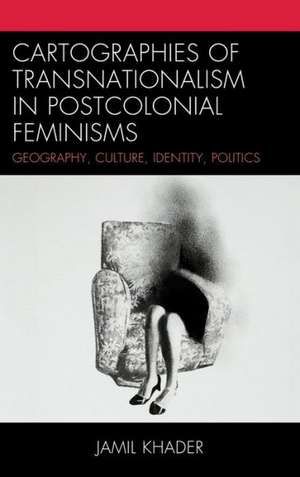Cartographies of Transnationalism in Postcolonial Feminisms
Autor Jamil Khaderen Limba Engleză Paperback – iun 2014
Preț: 460.43 lei
Nou
Puncte Express: 691
Preț estimativ în valută:
88.10€ • 92.23$ • 72.90£
88.10€ • 92.23$ • 72.90£
Carte tipărită la comandă
Livrare economică 05-19 aprilie
Preluare comenzi: 021 569.72.76
Specificații
ISBN-13: 9780739197554
ISBN-10: 073919755X
Pagini: 212
Dimensiuni: 152 x 226 x 15 mm
Greutate: 0.3 kg
Editura: Rowman & Littlefield
ISBN-10: 073919755X
Pagini: 212
Dimensiuni: 152 x 226 x 15 mm
Greutate: 0.3 kg
Editura: Rowman & Littlefield
Notă biografică
Cuprins
Introduction: The Poetics and Politics of Displacing: The Extimate Locations of Postcolonial Feminisms
Chapter One: ¿The Meaning of So Many Roads¿: Geography, Circular Migrancy, and Decolonizing the Commonwealth in Puerto Rican Feminist Writings
Chapter Two: ¿None of the Women are at Home¿: Culture, Unhomeliness, and The Politics of Expansion in Tsitsi Dangarembgäs Nervous Conditions
Chapter Three: ¿Escaping the Claustrophobia of Belonging¿: Identity, Transracial Ontology, and Rewriting the Columbus Quincentenary in Louise Erdrich¿s Fiction
Chapter Four: "We Palestinians are the Jews of the Arab World": The Politics of Solidarity, the Ethics of Otherness, and Anti-Colonial Internationalism in Raymonda Tawil¿s My Home, My Prison
Conclusion: Did Anyone Say Revolution? Postcolonial Feminisms, Cosmopolitics, and the End of Revolutionary Politics
Descriere
This book proffers an original theory of postcolonial feminist writings, and bears witness to the radical possibility of the work of some prominent and other less-known postcolonial women writers from Africa, the Middle East, the Caribbean, and the Americas.

















